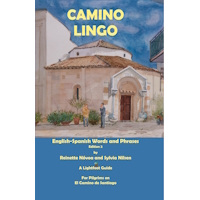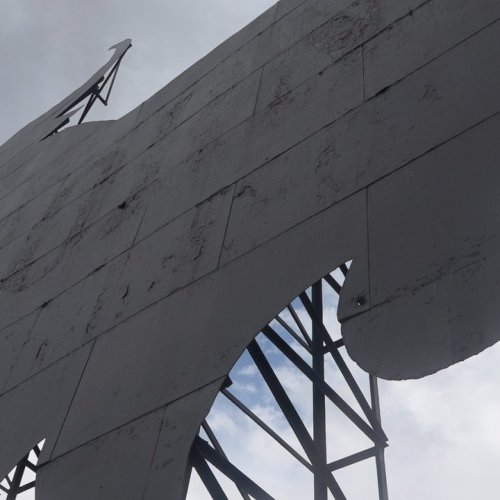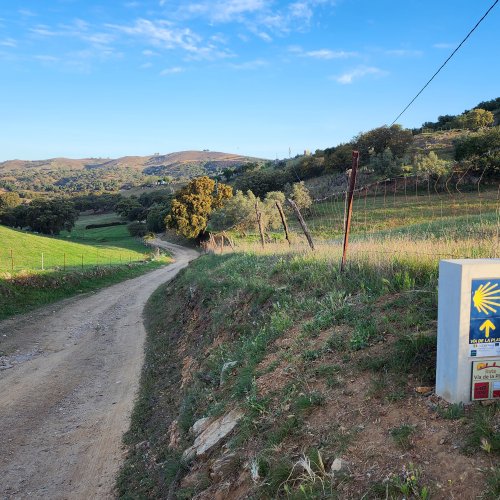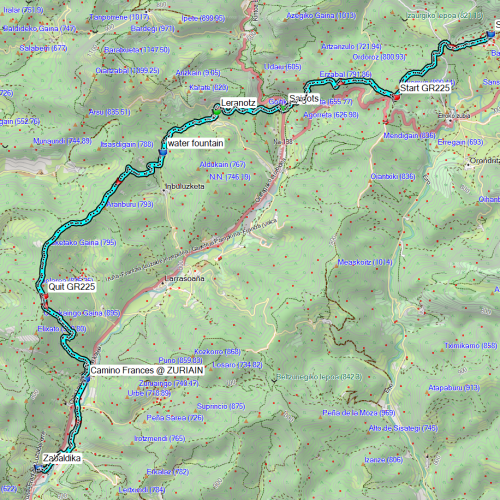I walked from Porto last April (2015). My favorite, and usually only needed Portuguese phrase was a question: "Fala Ingles?" (Do you speak English?) They usually picked up the conversation from there. My Berlitz book and all my apps were largely surplus needs to conversational requirements along the coastal route, and were used from then on for menu and sign translation...
BTW, "fala" is pronounced like it reads "fah-la."
There were one or two times the person could not speak English well enough to communicate. But, they ALWAYS had someone available on their mobile phone, or a nearby friend who could, and did jump right in.
Lost on arrival in Lisbon Oriente train station at 22:00, exhausted and jet lagged, having missed air connections and my original reserved train to Porto, I wondered aloud (in English) just what the f*** was I to do now, while staring at the departing train monitor. I knew I needed to make the one, last train from Oriente to Porto in 20 minutes. The station loomed dark and ominous. If you've been to Oriente late at night you will understand. Even for a large fellow like me, it was creepy and not a little scary.
I felt a tug at my elbow and turned around. A pretty young woman, with a teenaged daughter in tow, asked me in perfect, unaccented English if she could help. Doh! I explained my need to make the next, and last, train to Porto, and hat I had to exchange the ticket for the earlier, missed, train. She explained that her daughter was on the same train to Porto and that we could all find the ticket seller window together. I am not overly emotional, but I nearly lost it there.
I thanked her profusely, and told here that she was my Guardian Angel. She laughed and explained that she had family in the States and had attended university there for several years. Man! Was I ever lucky! BTW - her daughter, perhaps 18 or so, also spoke fluent English.
I made my train, and slept most of the three hours to Porto. I called my Porto hotel (IBIS Business) from the train to confirm that I was on my way and that they should hold my room...they did. I finally got to my room about 01:30 the day after I was supposed to arrive.
Just FYI - I usually try to book my first night at a chain hotel where English speaking desk personnel can be assumed, or with direct e-mail. In extremis, I say a brief prayer and use my Belgian SIM'd GSM phone to make a voice call to try to speak to the desk clerk who answers. In four outings it has not failed me yet.
And that, my friends is why, at least when commencing a Camino and coming from afar, one should IMHO:
1. Arm yourself with dictionaries and translation capabilities, if you do not speak at least a little of the language. You can use smart-phone versions (less added weight) or paper versions if you are a smart-phone Luddite, as I was until last year. I had practiced with a CD-based Berlitz course for some weeks before.
2. Allow adequate, no generous, connection time between flights and inter-modal (air to rail) connections. It is better to spend time in a boring airport, inside security, than to miss a connection. One disruption can ripple across your entire schedule and ruin the start of your Camino.
3. Research the layout of the airports, and train stations you will pass through. The plans are available online if you dive deep enough online.
4. Make hotel reservations for your arrival night destination, and update them with your travel status, via voice, text, or e-mail as necessary, so you actually have a place to sleep on arrival. It also helps if the staff at the arrival destination understand English. But online translation software (Google or Bing Translate) has saved me on numerous occasions.
5. Get to know your Guardian Angel! You never know when you might need their help...

I hope this helps.













